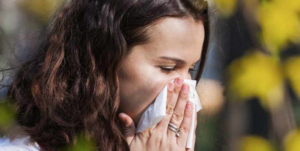As flowers bloom and temperatures rise, spring brings a breath of fresh air—but for many, it also brings sneezing, itchy eyes, and a stuffy nose. If you’re among the millions of Americans affected by seasonal allergies, also known as hay fever or allergic rhinitis, you know how disruptive the symptoms can be.
Thankfully, today’s healthcare options—including telehealth for allergies—make managing symptoms easier and more convenient than ever. In this blog, we’ll explore what causes seasonal allergies, how to recognize the symptoms, and why virtual care is a smart solution for fast relief.
What Causes Seasonal Allergies?
Seasonal allergies happen when your immune system overreacts to airborne substances that are normally harmless. The most common triggers, known as allergens, include:
- Pollen from trees, grasses, and weeds (most common in spring and fall)
- Mold spores, especially after rainy or humid days
- Dust and pet dander, which can worsen during seasonal changes
- Air pollution, which can amplify allergic reactions
When you inhale these allergens, your body releases histamines, causing symptoms like congestion, sneezing, and itchy eyes.
Common Symptoms of Seasonal Allergies
Seasonal allergy symptoms can range from mild to severe and may interfere with your daily activities or sleep. Common signs include:
- Runny or stuffy nose
- Sneezing fits
- Itchy, watery, or red eyes
- Postnasal drip
- Cough or throat irritation
- Sinus pressure or facial pain
- Fatigue and trouble sleeping
If these symptoms persist for more than a week or worsen with outdoor exposure, it’s time to consider treatment.
How Allergies Affect Your Sleep and Daily Life
One of the often-overlooked impacts of seasonal allergies is how they interfere with your sleep quality. Nasal congestion can make breathing difficult at night, leading to poor sleep, daytime drowsiness, and reduced concentration.
According to sleep health experts, treating allergy symptoms can drastically improve rest and overall well-being. If you’re waking up tired even after a full night’s sleep, untreated allergies might be the reason.
How an ENT or Allergist Can Help
While over-the-counter antihistamines work for some, others may need a more tailored approach. ENT specialists (ear, nose, and throat doctors) and allergists can:
- Identify specific allergens via skin or blood tests
- Prescribe stronger allergy medications or nasal sprays
- Offer immunotherapy (allergy shots or tablets)
- Rule out other causes of your symptoms, like sinus infections or asthma
If visiting a clinic isn’t convenient, telehealth for ENT and allergy care can help you get expert guidance without leaving your home.

Telehealth for Seasonal Allergies:
Thanks to telemedicine, you no longer need to wait days for an in-person appointment. At WebDoctors, you can consult a licensed provider online within minutes and receive a personalized treatment plan based on your symptoms.
Here’s how online allergy treatment works:
- Book an appointment online—no waiting rooms, no travel.
- Speak to a doctor via video call and share your symptoms.
- Get prescriptions sent to your local pharmacy if needed.
- Receive follow-up care to ensure your symptoms improve.
Our board-certified physicians are experienced in managing seasonal allergies, sinusitis, asthma, and related conditions—all from the comfort of your home.
Common Treatments for Seasonal Allergies
WebDoctors providers may recommend one or a combination of the following allergy treatments:
- Antihistamines: To block allergic reactions (e.g., cetirizine, loratadine)
- Decongestants: To reduce nasal swelling (e.g., pseudoephedrine)
- Nasal corticosteroids: To relieve inflammation (e.g., fluticasone)
- Eye drops: For itchy or red eyes
- Allergy testing referrals: If symptoms persist or worsen
If you’re unsure which treatment is right for you, a quick telehealth consultation can point you in the right direction.
Tips for Managing Seasonal Allergies at Home
Here are some simple steps to help reduce your exposure to allergens:
- Check pollen counts daily and limit time outdoors on high-pollen days.
- Keep windows closed and use air conditioning at home and in the car.
- Shower and change clothes after spending time outside.
- Use HEPA filters in your home to trap allergens.
- Avoid drying laundry outdoors where it can collect pollen.
Prevention is key to staying ahead of allergy symptoms—especially during spring and fall.
When Allergies Mimic Other Conditions
Sometimes, allergy symptoms overlap with other health concerns like asthma, sinus infections, or COVID-19. If you experience shortness of breath, persistent cough, or fever, consult a healthcare provider for an accurate diagnosis.
A virtual visit with WebDoctors can help distinguish between allergy symptoms and other conditions, saving you time and worry.
Ready to Breathe Easier?
Seasonal allergies can be frustrating, but with the right care, you don’t have to suffer. Whether you’re dealing with pollen allergies, mold exposure, or chronic sinus pressure, WebDoctors offers fast, affordable, and convenient care from home,
Don’t wait to get relief. Book your online consultation with WebDoctors today and start breathing easier.














